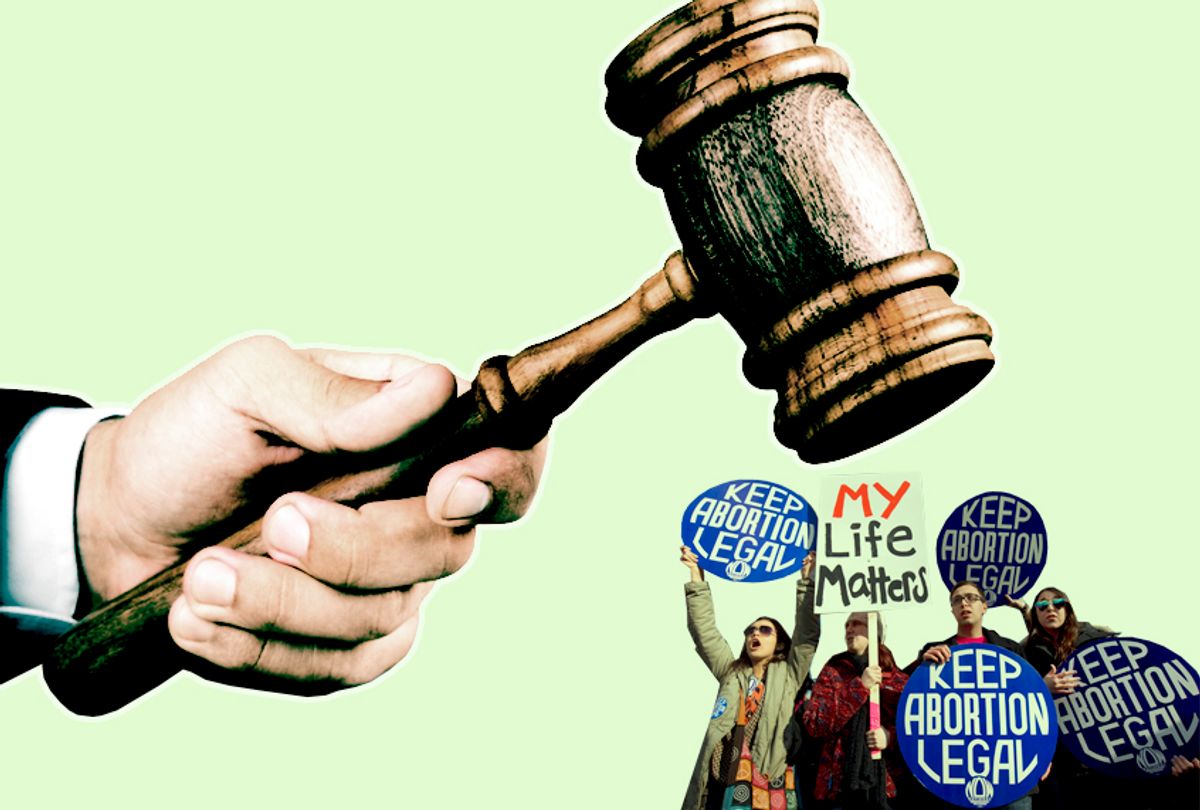In Alabama, Republican Gov. Kay Ivey has signed into law the most severe and draconian anti-abortion restriction in the United States: the Alabama Human Life Protection Act, which is almost a total ban on abortion in that state. The law, which forbids abortion even in cases of rape or incest and calls for sentences of up to 99 years in prison for doctors who perform abortion, is so extreme that even far-right evangelist Pat Robertson thinks it goes too far. Friday morning on MSNBC’s “Morning Joe,” anti-abortion conservative David French told hosts Joe Scarborough and Mika Brzezinski that the law is “100%” certain to be struck down in the lower courts as unconstitutional — without having a chance to make it to the U.S. Supreme Court for evaluation.
But the possibility of the Alabama Human Life Protection Act eventually being examined by the Supreme Court is exactly what Alabama Republicans have in mind: they are hoping that the High Court will reevaluate Roe, rule that it was wrongly decided and overturn it. And if Roe is overturned, that would be only the tip of the iceberg as far as Supreme Court rulings that could set back social progress in the United States. Roe was a right-to-privacy decision, and if socially conservative justices like Clarence Thomas, Brett Kavanaugh and Neil Gorsuch rule that Roe was wrongly decided, they could also strike strong decisions affecting everything from LGBTQ rights to access to contraception.
Here are some landmark Supreme Court decisions that could potentially be reversed if Roe v. Wade is overturned:
1. Griswold v. Connecticut
In 1965, feminist Estelle Griswold (who served as director of Planned Parenthood in Connecticut) challenged a Connecticut law banning contraception use by married couples—and in Griswold v. Connecticut, the Supreme Court under Chief Justice Earl Warren declared, in a 7-2 vote, that the law was unconstitutional. The High Court ruled that the law violated a couple’s “right to marital privacy,” and the right-to-privacy concept was subsequently used in Roe v. Wade. If the High Court decides that Roe was wrongly decided and is a violation of states’ rights, it could just as easily overturn Griswold as well and rule that access to contraception should be determined on a state-by-state basis.
2. Stanley v. Georgia
Obscenity laws in the U.S. deal with creation, sales and distribution rather than simple possession. In Roth v. the United States in 1957 and the 1973 ruling that tweaked it, Miller v. California, the Supreme Court ruled that sexually explicit material is legal as long as it isn’t obscene—and what is or isn’t obscene is determined by juries. The Warren Court’s 1969 ruling in Stanley v. Georgia, using the right-to-privacy concept in Griswold, determined that individuals could still be prosecuted for creating or selling obscene material but not for merely possessing it. But if Thomas, Kavanaugh and others overturned Stanley, Americans could face criminal prosecution simply for possessing hardcore porn that a prosecutor believed was obscene.
3. Eisenstadt v. Baird (1972)
The Supreme Court’s 1972 ruling in Eisenstadt v. Baird was an expansion of Griswold, extending access to contraception to unmarried couples. Eisenstadt struck down a Massachusetts law that prohibited the sale of contraception to unmarried couples, and it had a right-to-privacy element previously used in Griswold and Stanley. If the High Court decides that Roe was wrongly decided, it would likely draw the same conclusion about Eisenstadt as well.
4. Lawrence v. Texas
The reversal of Roe could have a domino effect in which the Supreme Court reevaluated a long list of right-to-private rulings, including 2003’s Lawrence v. Texas—which struck down a sodomy law in Texas as unconstitutional and in doing so, invalidated anti-gay sodomy laws nationwide. Justice Anthony Kennedy, a libertarian, was a “yes” vote in Lawrence v. Texas, while Justice Clarence Thomas and the late Justice Antonin Scalia were among the dissenters. But Kennedy has since been replaced by Justice Brett Kavanaugh, a social conservative in the Thomas/Scalia vein. And if Roe and Griswold are overturned as violations of states’ rights, it is entirely possible that the Court’s socially conservative majority would reverse Lawrence and rule that anti-gay sodomy laws—like access to abortion or contraception—should be determined on a state-by-state basis.
5. Obergefell v. Hodges
The states’ rights argument has been used to defend a variety of injustices over the years. In the 1950s, apologists for racist Jim Crow laws argued that while Massachusetts or New Jersey could have racial integration if they wanted it, Mississippi, Georgia and Alabama should be free to discriminate against African-Americans and apply their own standards. And many years later, when the Supreme Court legalized same-sex marriage nationwide with its 2015 ruling in Obergefell v. Hodges, critics of the decision made the same type of argument—insisting that Texas or Louisiana shouldn’t have to govern marriage in the same way as California. If the “states’ rights” argument is successfully used in overturning Roe, it could also be used in overturning Obergefell.


Shares